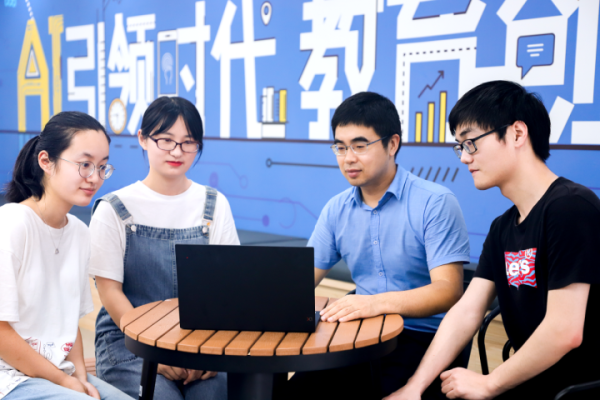
It is nearly intrinsic for mankind to identify people. But for computer science, it’s not the same case. Zhang Xiaoqing, born in Wenzhou in 1980s, the deputy party secretary and dean of college of computer science and artificial intelligence of Wenzhou University, has made tremendous efforts to equip AI with the ability to identify human faces and think like human with his research team.
Modesty and industriousness are two his highlighting personalities that impress people meet him most. When it comes to his research outcomes, such as 70 China national invention patents, the second prize of Chinese National Natural Science Award, he always attributes these glamouring victories to the concerted contribution of the team.
Finishing both postgraduate and doctoral study in Institute of Automation, Chinese Academy of sciences, his solidified connection with computer vison stems from his keen interest in mathematics. He excels at math since an early age, which can be proven by the awards he secured in the National Math Olympiad. When he studies in Central South University majoring in electronic information science and technology, he was tantalized by the charm of computer vision and human-computer interaction. Casting a backward sight to the long haul, failures mix with success and doubts come hand in hand with unwavering determination. But Zhang faiths in that success revolves around the continual losses, which is the keyword in the post-80s researcher’s legend. In the end, he was labeled as the second prize-winner of National Natural Science Award for group project in visual motor pattern learning and understanding.
Applying scientific fruits to daily practice is his and group member’s common pursuit. Once the changes in the surrounding environment are successfully processed, the robot can further realize intelligent decision-making and autonomous behavior. After the robot is equipped with "eyes", it will better serve People's Daily life. This is not empty talk. Take traffic monitoring as an example. The pair of artificial eyes is rather sensitive to abnormal car tracks and then reports to the police. It works as a assistant that reduces workload of police so as to free more available police forces and wins more precious time to medically aiding the casualties on road. Also, the smart eye, functioning in line with the social culture of showing politeness to pedestrians on zebra lines, leaves no space for those rule-breaking behaviors and automatically monitor all-day traffic situation with little human efforts. Too many jobs the man-made eyes can do. Here just name a few.
Alongside with all the research task, he doesn’t forget his responsibility as a teacher. Among all these big prizes he had ever gained, Wenzhou University’s award for outstanding teacher is put at the top of list when asked which prize impresses him most. He said, his realization of values can not leave from class podium and teachers should make sure every student has a thriving growth. In 2012, the e-commerce business started up by his student Zhang Liangyu, is on the verge of going bust due to the fierce market competition. But Zhang Xiaoqing helped him do a deep analysis of the situation and prepared sufficient resources for the Wechat account “University in hand”. With all these favors, the account evolves into an online platform aiming at providing on-campus marketing servicse. In 2014, the project won the gold prize of "Innovation Youth" National Challenge Cup College Student Entrepreneurship Plan Competition, the gold prize of Zhejiang Province "Internet +" Competition, and won several rounds of financing. Also, Zhang Liangyu was selected as one of the 30 elites at an age below 30 by Forbes in 2018 and one of the 2019 Hurun Under 30s Entrepreneurial Leader.
Thriving scientific research while practicing teaching is the path where Zhang Xiaoqing pays his persistence and struggle.
Editor: Fan Wenwu